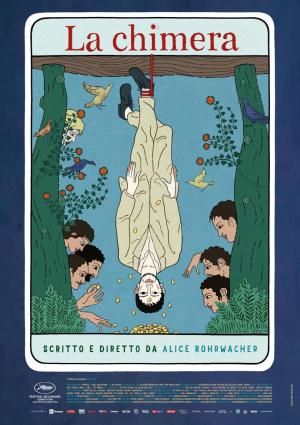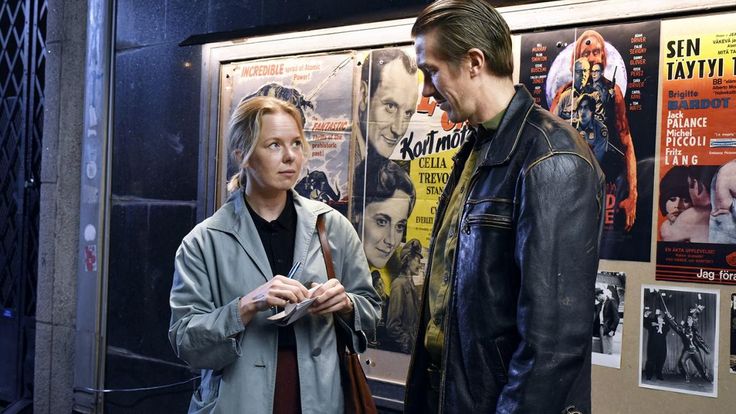The 6 Best Foreign Language Films of 2023
As the year comes to an end, one of our favourite things to do is look back on the foreign-language art, content, and entertainment that has enriched our minds throughout the year. This year, I embarked on a cinematic adventure at the prestigious Mar del Plata International Film Festival (Argentina) —an event that stands proudly among the elite, rubbing shoulders with the likes of Cannes, Venice, and San Sebastian as one of the select few "Class A" festivals in the world.
Now, with the echoes of applause still lingering in the air, we present to you our curated list of the 6 Best Foreign Language Films of 2023.
Table of Contents
→Sign Up Now: Free Trial Language Lesson With a Native Teacher!←
La Chimera
Director: Alice Rohrwacher
Countries: Italy / Switzerland
Language: Italian
Score: 8
Fresh out of prison and on a quest to find his departed love, Beniamina, dishevelled English archaeologist Arthur reunites with his unconventional team of tombaroli partners. This merry band of rovers, a carefree bunch of wandering grave-robbers sustains themselves by raiding Etruscan tombs and selling the unearthed ancient treasures.

La Chimera, via Pinterest.
In Alice Rohrwacher's films, there's something that could be described as magical, and not just because of her fondness for supernatural elements. In fact, the seamless integration of these elements into her stories is a testament to her skill in crafting atmospheres, situations, and worlds where the presence of magic not only feels possible but expected. Arthur, an English archaeologist and looter, is a melancholic protagonist surrounded by a lively troupe of thieves who always seem to be in motion, like dancers or circus performers. They seek treasures; he pursues a chimera. And yes, it's all as beautiful as it sounds, despite a subplot reminiscent of Indiana Jones with a somewhat cartoonish villain.
This subplot made me ponder a future where, like so many independent directors these days, Rohrwacher might veer into studio filmmaking, abandoning her unique vision. Hopefully, that never happens, and she continues to speak to us with her own, peculiar voice.
Cerrar los ojos - Close Your Eyes
Director: Victor Erice
Countries: Spain / Argentina
Language: European Spanish
Score: 9
A renowned Spanish actor, Julio Arenas, vanishes during the filming of a movie. Even though his body is never found, the police determine that he suffered a seaside accident. Many years later, the mystery resurfaces due to a television program aiming to evoke the actor's legacy. As an exclusive, it presents footage from the last scenes he participated in, filmed by his close friend, director Miguel Garay.
It's impossible to attend Cerrar los ojos in a cinema and not feel that you are in the presence of something grand, urgent, and almost too personal. With a languid pace that leaves us suspended in time, Erice seems to approach the act of remembering not only as a theme but also as the essence of his narrative: a series of veiled scenes and dialogues, perhaps altered by emotion. We’ve seen countless films about missing people and a hero who tries to reconstruct the mystery surrounding their disappearance. However, here, it's not a detective who undertakes the task but a friend, someone who shares a past that is always more intriguing in suggestion than in revelation. This emotional proximity between the two characters makes the movie special, making it feel like a ghost story as much as a drama.
This is a triumphant return for Victor Erice, a film of powerful restraint about friendship, memory, and the mystery of human desire.
La sociedad de la nieve - Society of the Snow
Director: J. A. Bayona
Countries: Uruguay / Chile / Spain
Language: Latin Spanish (Uruguay)
Score: 9
This is the gruelling, terrifying, and ultimately inspiring true story of a group of Uruguayan friends who, in 1972, find themselves facing a life-altering ordeal. Their flight from Uruguay crashes into a glacier in the Andes, leaving only 29 survivors out of the 45 passengers. Stranded in one of the most hostile environments on the planet, they are forced to fight for their lives. Based on Pablo Vierci’s book of the same name, this is a fresh, more realistic portrayal of the “Alive!” story first published as a book in 1974 and as an American movie in 1993.
Watching this movie in a big theatre with the cast within arm's reach, the director, and at least a thousand others holding their breath was one of the most powerful cinema-related experiences I can recall. Throughout its robust running time, I experienced palpitations, sweat, and tears. That's what comes to mind two weeks later when I think about Society of the Snow: it is a tremendously physical film, both in what it portrays and in the response it elicits from the audience. It's a film where physical pain, hunger, smell, and cold don't let you catch your breath.
Perhaps, that's why some of the dialogue felt unnecessary. In the end, what is moving (and believe me, it is moving) is not so much what the characters say, their relationships, or even their personal stories. What moves you to tears is the human need to survive and the strength of a group of young people who endured the unthinkable.
La Bête - The Beast
Director: Bertrand Bonello
Countries: France / Canada
Language: French
Score: 8.5
In a future not far off where emotions are undesirable, Gabrielle chooses to cleanse her DNA using a device that allows people to revisit their past lives to heal trauma and eliminate intense feelings. Throughout this experience, she meets Louis and experiences a profound connection, as if she'd known for centuries.
Two very interesting things happened to me while watching The Beast. On one hand, predicting its course was impossible. Like the beast that lends its name, the film morphs, hides, reveals itself in different forms, and strikes when least expected. On the other hand, I consistently felt in the presence of an author with a distinct agenda, someone with a singular vision unconcerned about pleasing a particular group or serving as bait for the Oscars. However, perhaps the most memorable aspect of this film is Léa Seydoux's performance (could it be the best of the year?) in a triple role, embodying different incarnations of herself across three timelines.
Towards the end of the film, standing before the man she desired three times, Seydoux ends the movie with a scream of genuine horror (in response to a revelation we won't disclose) that I think I'll never forget.
Kuolleet lehdet - Fallen Leaves
Director: Aki Kaurismäki
Countries: Finland / Germany
Language: Finnish
Score: 10
The first perfect score of this festival edition goes to the briefest and least pretentious film I've seen at this year’s festival. Set in an uncertain time (radios persistently report on the latest bombings in Ukraine, but all devices seem to be from another era), Fallen Leaves follows two shy characters living solitary lives in Helsinki: Ansa, a supermarket employee, and Holappa, a construction worker. One night, they meet at a karaoke, exchange glances, and seem to recognise a shared sense of loneliness. From then on, a dance of encounters and missteps begins. It could have been just funny, but the tragicomic mishaps that threaten to separate the two lovers are also moving — their love is just so delicate and endearing in its clumsiness that it’s impossible not to root for them.

Fallen Leaves, via Pinterest.
With an almost comically eclectic soundtrack (Gardel's tango song "Arrabal amargo" plays in a scene set in a seedy bar), Fallen Leaves is a story about the failures and triumphs of working-class individuals (something we don’t often see on the big screen), but it's also a tribute to the introverted, the broken, the losers, and above all, a simple form of love, far from neuroses and over-explanations.
Seagrass
Director: Meredith Hama-Brown
Country: Canada
Language: English
Grade: 8
Seagrass tells the story of a Japanese-Canadian woman navigating the aftermath of her mother's death while spending a week in a retreat with her family. As the dynamics with her husband start affecting the children's emotional stability, the family goes through a lasting transformation.
In this film, there's a little girl who, unable to make friends at the retreat pool her parents brought her to, clings to a violet inflatable ball; there's a couple who, confessing they don't love each other and perhaps never did, share the only genuine gesture of tenderness we'll witness from them throughout the entire film; there's another girl, no longer so young, discussing menstruation with her friends while her younger sister waits to go play. Seagrass is filled with moments that overwhelm with their truth and level of detail, as if they were a collection of memories. But, far from resorting to naturalism as its only tool, the director continues to explore cinematic resources: in the use of blur to depict a woman feeling blurred in her role as a wife; in the ominous dark cave she returns to with insistence; in the ghostly manner in which the camera wanders through a house where the presence of a deceased grandmother and her Japanese tradition seem to unsettle a family trying to adapt to Canadian culture.
A constant atmosphere of imminent danger, a storm brewing on the horizon, and the sense that something is about to explode hovers over everything. To have achieved all this in a debut film speaks volumes about Meredith Hama-Brown, a young director worth keeping an eye on.
Beyond Foreign Language Films: Learn a New Language Now
With both promising debuts, long-awaited returns from legendary directors and fresh retellings of well-known stories, this has been an amazing edition of the Mar del Plata Film Festival. More than ever, we are convinced that the world of foreign language films offers us a unique privilege—an opportunity to not only explore diverse artistic visions but also to immerse ourselves in different cultures. The ability to witness these cinematic gems allows us to transcend borders and gain insights into the human experience from various perspectives.
→Sign Up Now: Free Trial Language Lesson With a Native Teacher!←
Today, let's capitalise on this curiosity, go beyond subtitles, and deepen our connection with global narratives. If you're inspired to dive deeper into the languages that bring these stories to life, join us at Listen & Learn for a language course that opens doors to new worlds and perspectives.
All you have to do is send us a quick message telling us what language you want to learn and where (for example, take a Spanish course in London) and we’ll match you with a personalised language course, either in-person or online.


